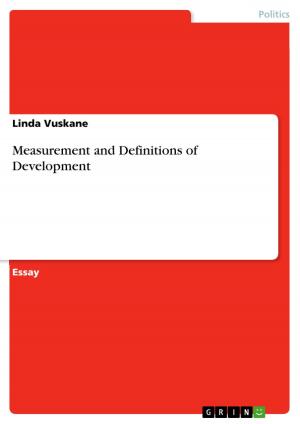The impact of institutional structures on the behaviour of actors in the legislative process. The Case of the German Immigration Law
Nonfiction, Social & Cultural Studies, Political Science, International, Foreign Legal Systems| Author: | Christina Zimmer | ISBN: | 9783638412827 |
| Publisher: | GRIN Publishing | Publication: | August 29, 2005 |
| Imprint: | GRIN Publishing | Language: | English |
| Author: | Christina Zimmer |
| ISBN: | 9783638412827 |
| Publisher: | GRIN Publishing |
| Publication: | August 29, 2005 |
| Imprint: | GRIN Publishing |
| Language: | English |
Seminar paper from the year 2002 in the subject Politics - Political Systems - Germany, grade: 2,0, University of Constance, course: Comparative Institutional Analysis, 18 entries in the bibliography, language: English, abstract: 'Eklat im Bundesrat' (scandal in the Bundesrat) read the headline of the Frankfurter Allgemeine (FAZ) on 23 March 2002. Leading politicians of CDU-CSU (the Christian Democrats) even made out a constitutional crisis and the political landscape in Germany was in a state of turmoil well before the official start of the election campaign. The reason for all this noise was that the Bundesrat, the second legislative chamber, had passed a controversial bill in a contested way the day before. This paper will address the following research question: What is the impact of institutional structures in the German legislative process on the behaviour of actors in the legislative arena? My central argument can be stated as follows: The behaviour of the central actors, which often have conflicting preferences, is influenced by formal and informal institutions in the legislative process. The specific outcome can then be explained by their strategic use of institutional opportunities and their awareness of institutional constraints. The remainder of the paper is structured as follows: I begin by stating the general assumptions central to the rational choice institutionalist model introduced here. In the following section, I will identify the actors in the legislative process before presenting a set of assumptions concerning their preferences. I will then describe the institutional structures of the legislative process before giving a set of theoretical arguments and hypotheses concerning their possible impact on the behaviour of actors. Finally, I will have a look at the impact of these institutions on the actual outcome in the case of the Immigration Law. The concluding remarks will give a short summary of the findings.
Seminar paper from the year 2002 in the subject Politics - Political Systems - Germany, grade: 2,0, University of Constance, course: Comparative Institutional Analysis, 18 entries in the bibliography, language: English, abstract: 'Eklat im Bundesrat' (scandal in the Bundesrat) read the headline of the Frankfurter Allgemeine (FAZ) on 23 March 2002. Leading politicians of CDU-CSU (the Christian Democrats) even made out a constitutional crisis and the political landscape in Germany was in a state of turmoil well before the official start of the election campaign. The reason for all this noise was that the Bundesrat, the second legislative chamber, had passed a controversial bill in a contested way the day before. This paper will address the following research question: What is the impact of institutional structures in the German legislative process on the behaviour of actors in the legislative arena? My central argument can be stated as follows: The behaviour of the central actors, which often have conflicting preferences, is influenced by formal and informal institutions in the legislative process. The specific outcome can then be explained by their strategic use of institutional opportunities and their awareness of institutional constraints. The remainder of the paper is structured as follows: I begin by stating the general assumptions central to the rational choice institutionalist model introduced here. In the following section, I will identify the actors in the legislative process before presenting a set of assumptions concerning their preferences. I will then describe the institutional structures of the legislative process before giving a set of theoretical arguments and hypotheses concerning their possible impact on the behaviour of actors. Finally, I will have a look at the impact of these institutions on the actual outcome in the case of the Immigration Law. The concluding remarks will give a short summary of the findings.















